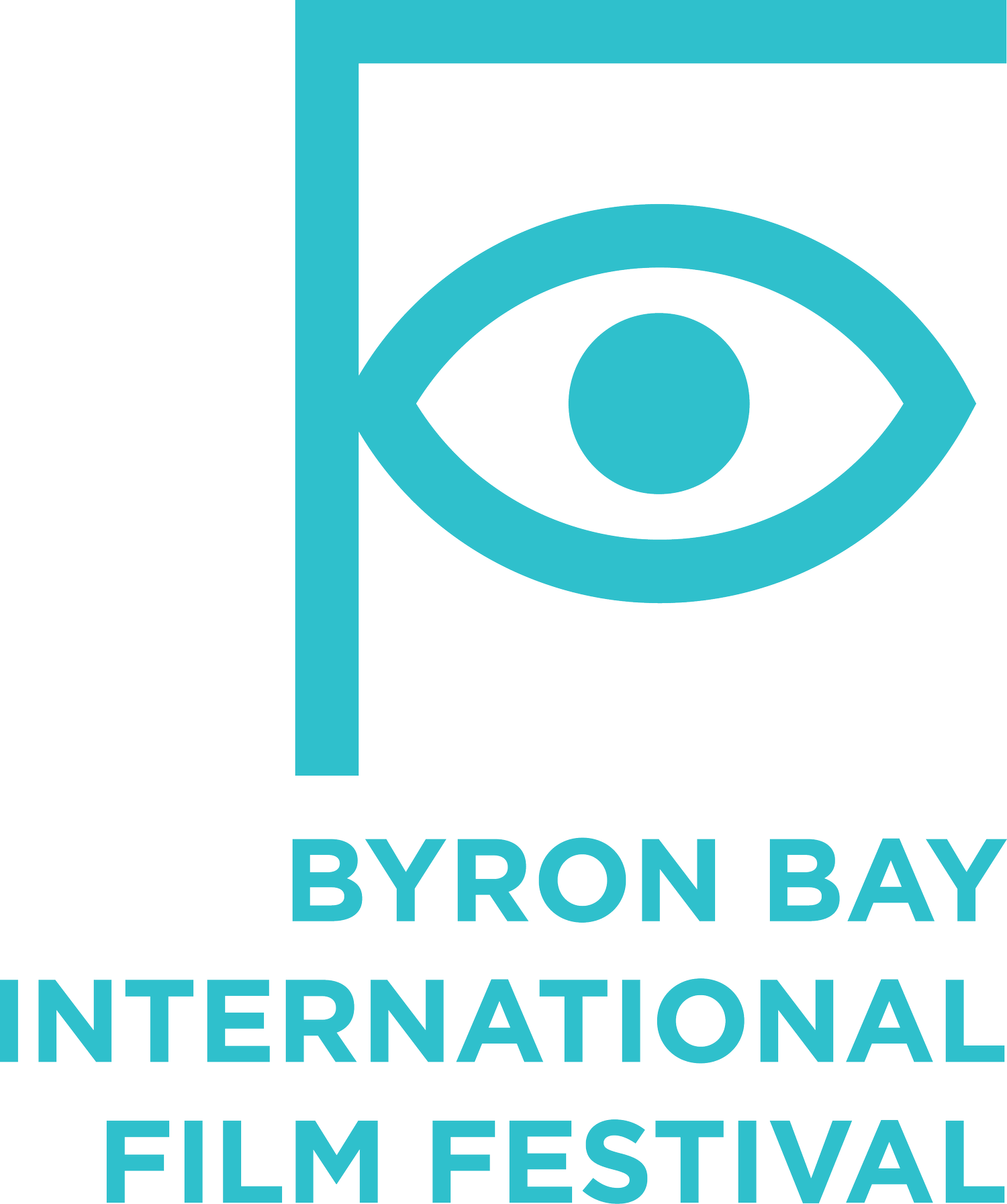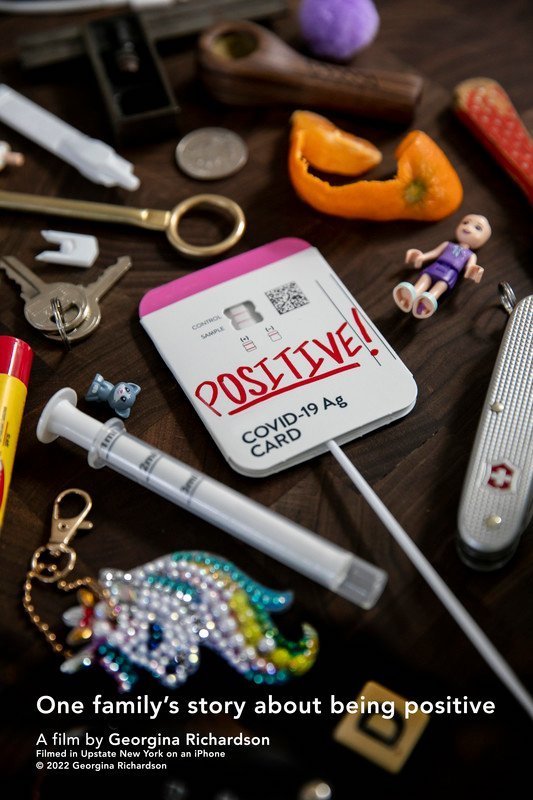BBFF2022 Meet the Filmmaker: Georgina Richardson
POSITIVE!
Georgina Richardson takes us on her own journey with her family’s story about being positive... 32 days in isolation with covid.
We had a chat to Georgina Richardson about the making of ‘Positive!’, her own experience as a filmmaker during the pandemic and making a film about her own personal journey.
Screening at Palace Cinemas Byron Bay
Tuesday 25 October at 6:30pm with See Mandy Run
Buy tickets
Where did the story or concept for your film come from?
I started making films on social media two weeks into the pandemic - most were mini comedy docs, many about our life as a family living in isolation during the pandemic. Many people started following me on Instagram! It gave me great joy and was a beautiful distraction, as well as a means to “process” the upheaval of the pandemic. I’m a 42-year old mother of two young kids, and in April 2020, they were 1 and 4 years old. I was a full-time photographer, running a studio with over a dozen photographers in New York City, and overnight, as we all know, life stopped. We moved our family "upstate" (it's called The Hudson Valley and north of New York City) into a house in a forest. We managed to avoid getting Covid for well over a year, got vaccinated but then we all finally got Covid in October 2021, and there were still a number of strict isolation requirements by New York State. At that point, I had made hundreds of mini films on social media, so I knew I was going to film what was happening to us. I knew that there were going to be painful as well as funny moments to discover. I knew I had to hang onto my mind by hanging onto my iPhone; to film what was going on was a way to deal with the stress. And so many parents were like me, they were losing their minds, so I knew I had to document our family’s experience.
Have you always wanted to be a filmmaker?
I've always been a film-maker, or maybe it’s more accurate ot say "story-teller” because the medium of film wasn’t always the medium I worked in. I was the kid with the VHS recorder making movies with her neighbours. But I became a photographer in my twenties, it was the classic thing of choosing a career that was almost what you wanted to do, but not quite, to keep the pressure of failure off your shoulders. I started improv classes, stand-up and eventually trained as an actor at The Stella Adler Studio in Manhattan…I enrolled in their night program so I could keep working as a photographer. Because photography was never “enough" for me to express my thoughts and ideas, the sound and sequence of film were always missing...but when Covid hit, I was given an opportunity to refocus my life. I still shoot as a photographer (because "mummy has to pay the bills” as I say to my kids), but I am transitioning into becoming a full-time film-maker.
As a filmmaker what is your favourite memory you had in the process of creating this film?
Living through getting Covid with my family was "a bit stressful" but reviewing all the footage had me laughing my youknowhat off. My kids on film cracked me up the most.
Why do you think short films are an important medium to explore creativity through?
Short film-making serves many purposes. Primarily, there are stories that need a short format. I make a 2 or 3-minute film every week, sometimes twice a week, and put it on social media. And I’ve learned that, like a haiku, sometimes a short film can pack a huge punch - and in much less viewing time! And sometimes you have an audience, particularly, say, a social media audience (like in my case), who only have a certain amount of time - so sometimes you’re also creating a short story due to your audience. Packaging a story in short form demands precision and efficiency, and so there’s also a beautiful learning curve for the film-maker. Creating short films regularly has taught me so much about story arcs and being clear with your story and characters, prioritising efficient production, understanding the power of editing and it has given me momentum in terms of understanding what it is I actually want to say through film. Short films are also critical for new film-makers, because most of us are terrified! And although a short film is still a mountain to climb, it’s a first mountain that maybe we can summit. But I also think you could spend a lifetime making shorts because I think some of us have stories that fit this medium perfectly, that require a short format "only", and I have to say part of me wonders if I am one of those filmmakers actually...
Part of the filmmaking process is you will face challenges, how did you overcome these?
My biggest challenge was having the faith in myself to "complete" the film. Shooting it was second-nature, but editing it and then submitting it to festivals, this was challenging for me, because I did not think it was "good enough"...because I did not think I was good enough. Before the pandemic, I would never have been able to sit in the discomfort and uncertainty of having the amount of footage I had to edit in order to complete a film (even though I felt such a strong need to make it and felt it was a story that many people and families can relate to). By creating many short films over the past two years on social media, and also by doing a lot of therapy, I built up my self-esteem (and therefore patience...and then courage) as an artist and I was able to make this film. And I was also almost unable to submit this to festivals because I was so afraid of being rejected (which I was! Many times!) - but I talked myself into it by learning, through therapy and working on all the short films I've worked on, to laugh and be gentle, kind with myself - in order to get over my perfectionism and self-doubt as an artist. And I'm still working on it everyday!
How did the pandemic affect you as a filmmaker? And this film?
I wouldn't be a film-maker without the pandemic. I took our kids to live in a house in a forest, away from New York City in March 2020, and this time allowed me to examine who the hell I am, what I want from my life and what I have to say. The endless months of solitude allowed me to connect deeply with my kids and my husband (in a way I wasn't able to back in New York living a very hectic life as a working photographer), showed me what I truly love to do everyday and that I could still do it, even at 40! I am grateful for the pandemic, and I know that is a privileged, and some may say insensitive thing to say because of how many people have suffered and lost their lives - but in many ways I say "I'm grateful for my life!" in honour of those people who deeply suffered and died because of the pandemic.
What is next for you in the future?
I'm writing a longer-form/episodic story called "Morning Wood" about a musician who runs a music studio in Woodstock (in Upstate New York). I will be playing all the characters and musicians. I'm hoping to have that either picked up by Netflix or online in 2023. I am also planning on showing my film "Positive!" on the big screen here in the Hudson Valley (upstate New York, where I live) and/or in New York City...and I can hardly wait to see the reactions of my friends, most of whom are pandemic-parents also...because pandemic-parenting has been so hard, but we also need to laugh about it.
What is your biggest creative influence on your filmmaking style?
These words by Henry David Thoreau "I went to the woods because I wished to live deliberately, to front only the essential facts of life, and see if I could not learn what it had to teach, and not, when I came to die, discover that I had not lived"... I'm inspired by Tracey Ullman, Chris Lilley, Bill Hader, Catherine O'Hara, Christopher Guest, Werner Herzog, The Coen Brothers, Richard Linklater and Charlie Kaufman. And I meditate. And this is my greatest influence.
What is a piece of advice you can give to all aspiring filmmakers?
Read "The War of Art" (by Steven Pressfield), live somewhere that isn't crushing your soul by demanding you always have to work to afford to live there and doesn't actually leave you any time to create, do yoga, meditate daily, get therapy (or even group therapy), surround yourself with people who inspire and encourage you and let go of the ones who bring you down, remind yourself daily that today could be the last day here, so get on with it now. Read great books and poetry, watch films, walk in nature everyday. You know what your soul deeply wants to do, start listening to it. And finally, be grateful for whatever small things you can be grateful for now...and day by day you will find more and more things to be grateful for. This is how to find happiness, and the courage to be who you truly are.
BBFF is dedicated to expanding audiences' minds as well as growing our collective consciousness.
Story-telling through film has the power to help us heal and grow, and I feel Byron is committed to this higher purpose.
Film festivals in general are important experiences for film-makers because they can be recognised by audiences, and come together as artists to learn from each other.






